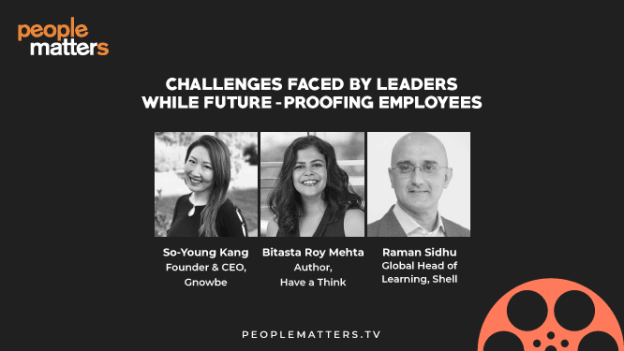Challenges faced by leaders while future-proofing employees

Staying relevant is key. At the same time, gaining an edge to stay ahead of the competition requires employees who are equipped for the challenges of a dynamically transforming work environment. For most leading experts in the HR realm, it is crucial to create an agile workforce ready to step out of their comfort zones to upskill themselves.
Today’s jobs do not guarantee future employability. That’s why, creating a learning journey within organizations is vital not only for the employees but also from a company’s development perspective.
In a recent panel discussion with People Matters TV, panelists: So-Young Kang, author of Inside Out: Conversations about Leadership and Innovation in a New Global Economy, and co-founder and CEO of Gnowbe, Raman Sidhu, Global General Manager of OD & Learning at Global Commercial, Shell, and Bitasta Roy Mehta, author of Have a Think - The practical guide to evidence-based HR, talked about the steps that HR leaders and employers can take to ensure that their organizations are ready to tackle the demands of the future workplace.
#1 Getting the business buy-in
Learning and development professionals today have to get the buy-in from various stakeholders in order to take their organization’s skill set to the next level--the leadership, CXOs, educators and the employees themselves.
Team leadership has a major impact on the way employees perceive the function of continuous learning.
So-Young Kang, author of Inside Out: Conversations about Leadership and Innovation in a New Global Economy, and co-founder and CEO of Gnowbe, a mobile learning app that builds learning journeys for professionals in a recent interaction with People Matters TV, talked about how the digital learning experience helps in motivating employees to conveniently participate in product learning that translates into improved business performance.
“Businesses are now looking to learning and development professionals to raise the game in order to be a strategic partner. Learning professionals are now invited to the table to discuss how do we build the capabilities not just for today but for the future,” So-Young Kang said. “The conversation has shifted now from jobs being replaced by tech to how can we empower employees through learning, development and technology.”
A major business ask from HR practitioners is to pave the way for enhanced product learning and skills development.
When it comes to getting employees ready for the future, Raman Sidhu, Global General Manager of OD & Learning at Global Commercial, Shell, said CXOs always turn to HR professionals to figure out how to measure the effectiveness of upskilling endeavors.
Aligning L&D efforts with the larger strategic goals of an organization is the most important step, Sidhu said. help Clear predictors of performance can help in mapping the learning journey and correlating it to actual improvement in business performance.
There are many predictors of performance ranging from creating a strong brand, appealing to the millennial workforce, product innovation or it could be about creating an ecosystem where there’s a lot of ideation within the company.
“Once you’ve established the correlation between predictors of performance and business performance, you can go to your CEO and say ‘look, whatever you want to achieve this year and years ahead, there are these things that must happen in an organization which are clearly predicting performance,’” Sidhu said.
Sidhu added that at Shell, his team found that the professionals who are inherently organized and meticulous about tracking their data are the ones who excel in sales functions. With a range of consistent learning programs through daily and monthly meetings, Sidhu’s team has been able to create a profile of a successful sales professional and identify what qualities and skills make them excel in their performance.
"Reskilling is the major business ask so that we maintain economic as well as social cohesion which is up for a challenge at the moment in both developed and developing economies,” said Bitasta Roy Mehta, author of Have a Think - The practical guide to evidence-based HR, and an expert in organizational development, people analytics and talent management.
#2 Putting yourselves in the learners’ shoes
Predictive analytics goes a long way in determining how people learn and how they might perform with additional skills.
“Confidence level is a predictor of high performance,” Kang said, based on an A/B testing that her team had undertaken to understand whether digital learning tools help build confidence in the learner and therefore translate into better performance. “Confidence level is something that we are starting to track because it is a precursor to enhanced performance.”
A constant dilemma that L&D specialists face when it comes to measuring success is how to engage learners in the material.
Kang said every business needs to redefine their learners’ persona and motivation behind learning. Most learners take up courses in order to achieve something--a promotion, a better job, better salary. Only a few fall under the category of those who learn for learning’s sake. Others might be sharers who love to post and share articles and videos with their network. Then, there’s another category of learners called “selective learners” who pop in and out of courses and complete only those parts which are relevant and interesting for them.
Once HR and L&D specialists understand the psyche of the learner in addition to using analytics in the right way to predict performance, it becomes easier to finalize on the metrics of measurement. Thus, keeping the learners’ background, personality and learning style in mind, L&D professionals can design interventions within their organizations to create an environment of continuous skill building.
If you measure the success of learning only based on completion rate, it would not account for the learners who are engaged and successful in the content that is relevant to them.
“We need to redefine the metrics of what success is,” Kang said. “Reframing the courses, recognizing that relevance, personalization, context, accessibility are also really critical.”
#3 Designing the right learning intervention
In order to design the best learning intervention, L&D leaders need to integrate business asks, learners’ profiles and long term organizational vision. The gaps lie in following-up after the learning sessions are complete. The leadership also needs to take an interest and measure the success of L&D initiatives.
Talent learning is crucial. An intervention should take an integrated approach that combines business goals with performance predictions and learners’ motivation. A segmented approach wherein every type of learner gets a chance to effectively grasp and implement the required concepts into action, said Sidhu.
“We must start with a purpose. Before designing any intervention, it has to start with what are we trying to solve,” said Kang. With adult learners, it is imperative to provide the context and answer the “why” questions.
Apart from the three major steps discussed in the panel, building the right mindset is a cultural transformation that can happen in organizations who are gearing up to be indispensable in the future of workplaces. That’s why approaching the challenge of future-proofing employees with a strategy and willingness to adapt and reconfigure will go a long way in ensuring that the business thrives and sustains simultaneously.
















